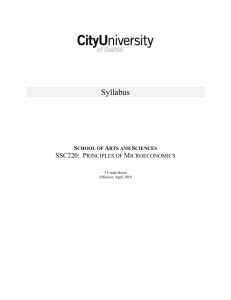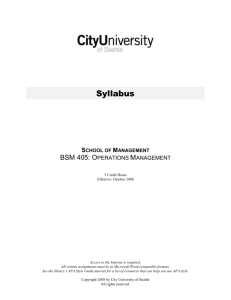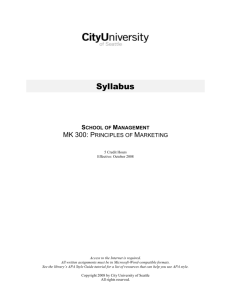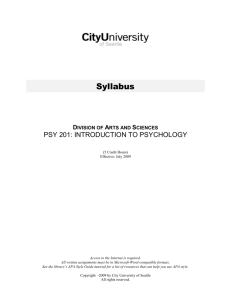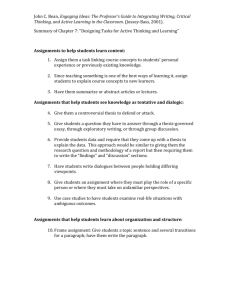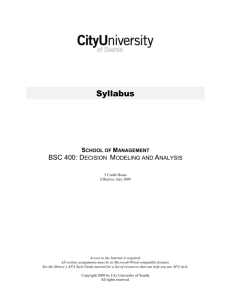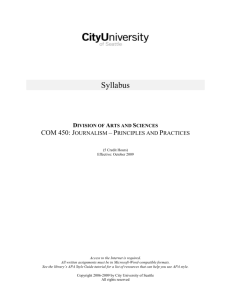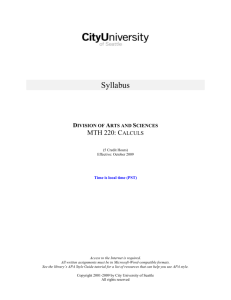SSC 218 Introduction to Political Science
advertisement
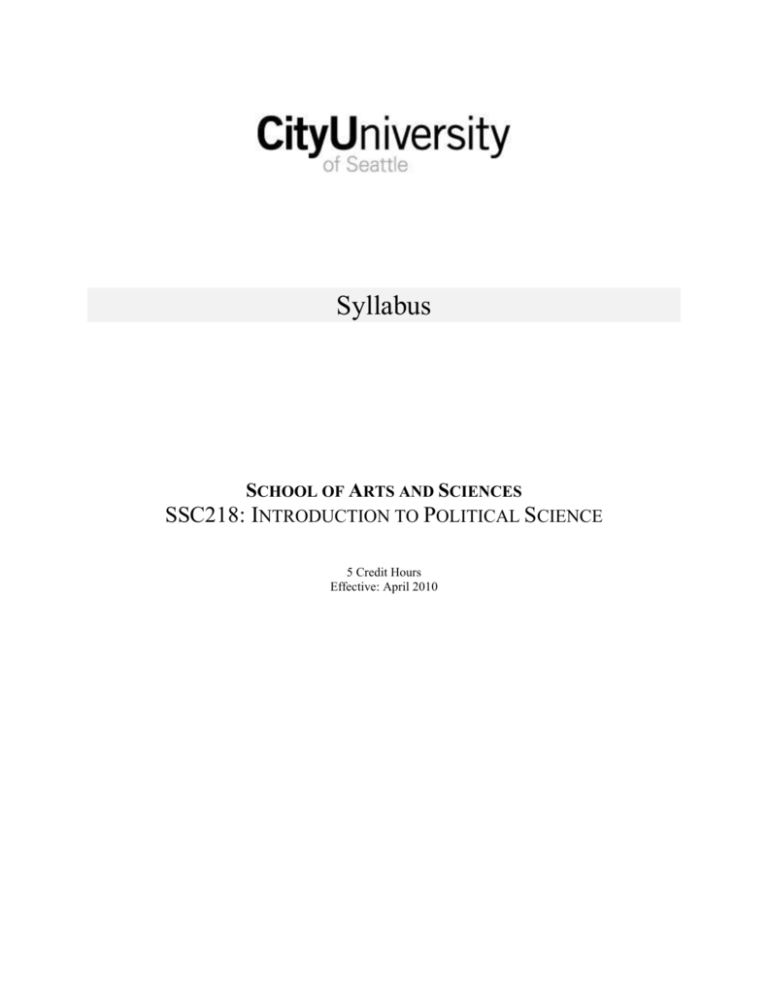
Syllabus SCHOOL OF ARTS AND SCIENCES SSC218: INTRODUCTION TO POLITICAL SCIENCE 5 Credit Hours Effective: April 2010 SSC218: INTRODUCTION TO POLITICAL SCIENCE FACULTY Faculty Name: Contact Information: COURSE DESCRIPTION This course is an introduction to the historical, legal, and psychological methods of understanding politics. Questions as fundamental as why people behave as they do in the political process are examined. The course also compares different political ideologies, forms of government, and the role of the individual and the state. A comparison of different governing institutions and processes between the United States and other countries will be made. The course will conclude with a section on the motivations, constraints, and instruments of international politics. COURSE RESOURCES Required and recommended resources to complete coursework and assignments are listed on the My.CityU portal at Library>Resources by Course. CITYU LEARNING GOALS The content of this course addresses the following CityU Learning Goals: Professional Competency and Identity; Diverse and Global Perspectives. PROGRAM CONTEXT This course fulfills social studies requirement for your degree. COURSE OUTCOMES In this course, learners will: o o o o o o o Describe the relationship between government and nations; Compare the major political ideologies; Describe forms of political action and the motivators for such action; Compare and contrast forms of political institutions and systems of governance; Outline major theories and impacts of political economy; Assess groupings of states within the international world by development status and goals; Describe the legislative, executive, and judicial sources of law. SSC218 Page 2 Eff: 04/10 CORE CONCEPTS, KNOWLEDGE, AND SKILLS o o o o o o o o o o Politics and political economy; Liberalism, socialism, and communism; The State and the Nation; Justice; Legitimacy; Democratization; Political parties and interest groups; Parliament; Power; Economic and political development. OVERVIEW OF COURSE GRADING The grade you receive for the course will be derived using City University of Seattle’s decimal grading system, based on the following: Overview of Required Assignments Discussion Activities Position Papers (two equally weighted) Quizzes (equally weighted) % of Final Grade 20% 40% 40% TOTAL 100% SPECIFICS OF COURSE ASSIGNMENTS Discussion Activities Whether in class, online, or in a mixed mode setting, students will be graded on their participation in classroom discussions; their ability to present, explain, or defend alternative viewpoints; and the degree to which they have mastered the concepts and principles inherent in the study of accounting at this introductory level. Written work will be assessed not only on relevance to the subject presented, but also on adherence to good written form and professional presentation. Grading Criteria for Each Discussion Activity Meets requirements of the activity in a timely manner 25% Adds insightful or new ideas, comments, or questions relevant to the activity and/or to other students’ posts Appropriately references readings, material in course sessions and other postings Writes clearly, concisely, and grammatically 25% TOTAL 100% SSC218 Page 3 Eff: 04/10 25% 25% Position Paper #1 and #2 Each position paper should take a clear position on a topic relevant to the course. Your paper should: a. Introduce and explain the topic. Explain why it is important to the reader. b. Take a position. Have a clear thesis statement. c. Defend your position with logical and persuasive arguments. d. Provide supporting evidence that is accurate and authoritative. Cite all your sources in APA style. The Thesis Statement: The process of writing your paper will begin when you formulate a thesis statement: a one-sentence, declarative statement that will define the scope and topic of your entire paper. Your thesis may be structured around any number of specific, course-related topics. The thesis statement should be very specific and suited to a paper five to six pages long. A good thesis for a position paper: 1. 2. 3. 4. 5. Is debatable; Can be supported by evidence; Can be countered by arguments against it; Is a clearly defined claim; Is not just based on personal opinion (Hult & Hulkin, 2004). It is wise to conduct some preliminary research before finalizing your thesis to ensure that you are on the right track and that adequate supporting materials are readily available to you. You may want to discuss your thesis or ideas with your instructor if you are having trouble formulating a thesis. The Preliminary Outline: After you have written your thesis statement and reviewed some primary and secondary research materials, you should write the preliminary outline for your paper. You may submit this outline to your instructor for feedback. The outline should be a tool to help organize your ideas; it should not inhibit the construction of your final product. Use it as a map to guide you in the writing of your paper. It can help you determine which sections are underdeveloped or need to be dropped from the paper. You may use either a full-sentence outline or a topic outline. The advantage of a full-sentence outline is that many headings can serve as topic sentences for paragraphs. The use of a subject and verb in each sentence heading also establishes the logical plan of your thinking. The Annotated Bibliography: To help your instructor evaluate your use of primary and secondary sources, in this course it is especially important that you submit an Annotated Bibliography with your paper. Each reference to be used in support of the research paper's argument is to be annotated. The criticism, explanation, or general comments about each source should be limited to a few sentences. Each source should be identified in APA format. Style and format: The body of your paper should be five- to six-pages long. It should be doublespaced. Margins, pagination and spacing should follow the format prescribed in the APA guide. Sources from which you borrow ideas or information must be cited using the APA format. SSC218 Page 4 Eff: 04/10 Grading Criteria for Position Papers Purpose Content Organization Grammar, Spelling, Writing Mechanics References APA 15% 35% 15% 10% 15% 10% TOTAL 100% Examinations You should be prepared to answer a variety of types of questions pertinent to the concepts covered in or suggested by the course materials and assignments. Your instructor may provide you with additional information regarding the content and style of exams in this course. OVERVIEW OF COURSE POLICY This document provides an overview of the course foundation elements, assignments, schedules, and activities. For information about general City University of Seattle policies, please see the City University of Seattle catalog. If you have additional questions about the course, please contact your instructor. Late Assignments Per Division of Arts and Sciences policy, undergraduate students are required to submit all assignments by the due dates stated in the syllabus. A late assignment is one that is submitted after the due date and time or after any extension has expired. If circumstances prevent a student from meeting the due date, the student is obliged to contact the instructor and request an extension at least 48 hours prior to the date the assignment is due. Emergency situations will be considered on a case-by-case basis. Being busy, pressured with outside work, or having competing academic commitments are not valid reasons to grant extensions. A student who receives an extension in advance of the due date and abides by the agreement with the instructor is not subject to late penalties. Without prior arrangement with the instructor, students who submit assignments late will receive a 15 percent deduction in grade each day or part of the day that the assignment is late. For example, if the assignment is submitted two days late, 30 percent of the grade will be deducted. Coursework received after one week (seven days) will not be graded and will receive a zero grade. Participation DAS Participation Policy (undergraduate) Undergraduate online and mixed-mode classes are required to use the Blackboard Discussion Board online. Participation through discussion to exchange knowledge, ideas, and thoughts is an integral, mandatory part of this course. Participation on the Discussion Board – the virtual classroom – enhances SSC218 Page 5 Eff: 04/10 the student’s learning process and experience in this course, and lack of participation will result in a reduction in grade (see grading rubric). Participation is active engagement in discussions in the form of sharing new ideas, examples and resources, as well as constructive disagreement and incorporation of course materials and concepts in comments. This requires frequent monitoring of the Discussion Board, timely responses, integration of course material and other sources, and ongoing conversations that extend, modify, and add to understanding, creating a vibrant learning community. The following guidelines apply to all DAS undergraduate online and mixed-mode classes: 1. For fully online courses, students are expected to spend one hour per credit hour per week participating in online activities (for example, for a 5-credit course, the student would spend 5 hours per week on the Discussion Board). It is expected that students access their Blackboard course shell, including the Discussion Board, a minimum of 3 days per week. For mixed-mode courses, students are expected to spend the allotted online hours participating in online activities (for example, for a 5-credit mixed-mode course where 3 hours are spent face-toface in a classroom, students would spend 2 hours per week on the Discussion Board). 2. The instructor will provide 2 or more discussion board questions/assignments by early Monday each week (normally 2 or 3 per week for fully online classes, and one or more for mixed-mode classes). Students must post their initial comments to each discussion board question/assignment no later than midnight Wednesday. 3. For each discussion question/assignment, a minimum of 3 thoughtful and topic-relevant responses to classmates’ comments are required no later than midnight Sunday. Explain why you agree or disagree, ask questions, add to or modify ideas, and respectfully find strengths and weaknesses in classmates’ ideas. 4. In order to encourage discussion, it is expected that students will participate throughout the week rather than waiting until Sunday to post all responses. 5. Each post should be at least one well-developed paragraph (no less than 10 sentences in length). “Good post” or similar responses are not considered contributions to class discussions and will not count toward posting requirements. 6. In addition to making at least 3 responses to classmates’ comments per discussion question/assignment, students must respond to all questions posed to their initial discussion comments. 7. All posts must have correct grammar, spelling, punctuation, and APA style. 8. Students are expected to act professionally and respectfully, avoiding personal attacks. Instructors have the right to remove inappropriate posts, and students will be held accountable to City University guidelines for student conduct. Professional Writing Assignments require error-free writing that uses standard English conventions and logical flow of organization to address topics clearly, completely, and concisely. CityU requires the use of APA style. UNIVERSITY POLICIES You are responsible for understanding and adhering to all of City University of Seattle’s academic policies. The most current versions of these policies can be found in the University Catalog that is linked from the CityU Web site. Scholastic Honesty SSC218 Page 6 Eff: 04/10 Scholastic honesty in students requires the pursuit of scholarly activity that is free from fraud, deception and unauthorized collaboration with other individuals. You are responsible for understanding CityU’s policy on scholastic honesty and adhering to its standards in meeting all course requirements. A complete copy of this policy can be found in the University Catalog in the section titled Scholastic Honesty under Student Rights & Responsibilities. Attendance Students taking courses in any format at the University are expected to be diligent in their studies and to attend class regularly. Regular class attendance is important in achieving learning outcomes in the course and may be a valid consideration in determining the final grade. For classes where a physical presence is required, a student has attended if s/he is present at any time during the class session. For online classes, a student has attended if s/he has posted or submitted an assignment. A complete copy of this policy can be found in the University Catalog in the section titled Attendance Policy for Mixed Mode, Online and Correspondence Courses. SUPPORT SERVICES Disability Resources If you are a student with a disability and you require an accommodation, please contact the Disability Resource Office at 1.800.426.5596 ext. 5228 as soon as possible. Library Services As a City University of Seattle student, you have access to library resources regardless of where and how you are taking this class. To access the resources that are necessary to complete your coursework and assignments, visit the library menu in the My.CityU portal at http://my.cityu.edu. A good place to begin your research is through the program or course resource sections that provide links to relevant journals, books, and Web sites. Search the library's online catalog to locate books and videos, and place requests to have items mailed to you (services vary by location). Search the online databases for journal, magazine, and newspaper articles. Articles that are not available full text in the library's collection can be requested from other libraries and delivered to you electronically. For additional help, submit your question via the Ask a Librarian e-mail service available through the portal or call 800.526.4269 (U.S. or Canada) or 425.709.3444. SmartThinking Online tutoring, writing services, and homework help is available at http://www.smarthinking.com. SSC218 Page 7 Eff: 04/10
